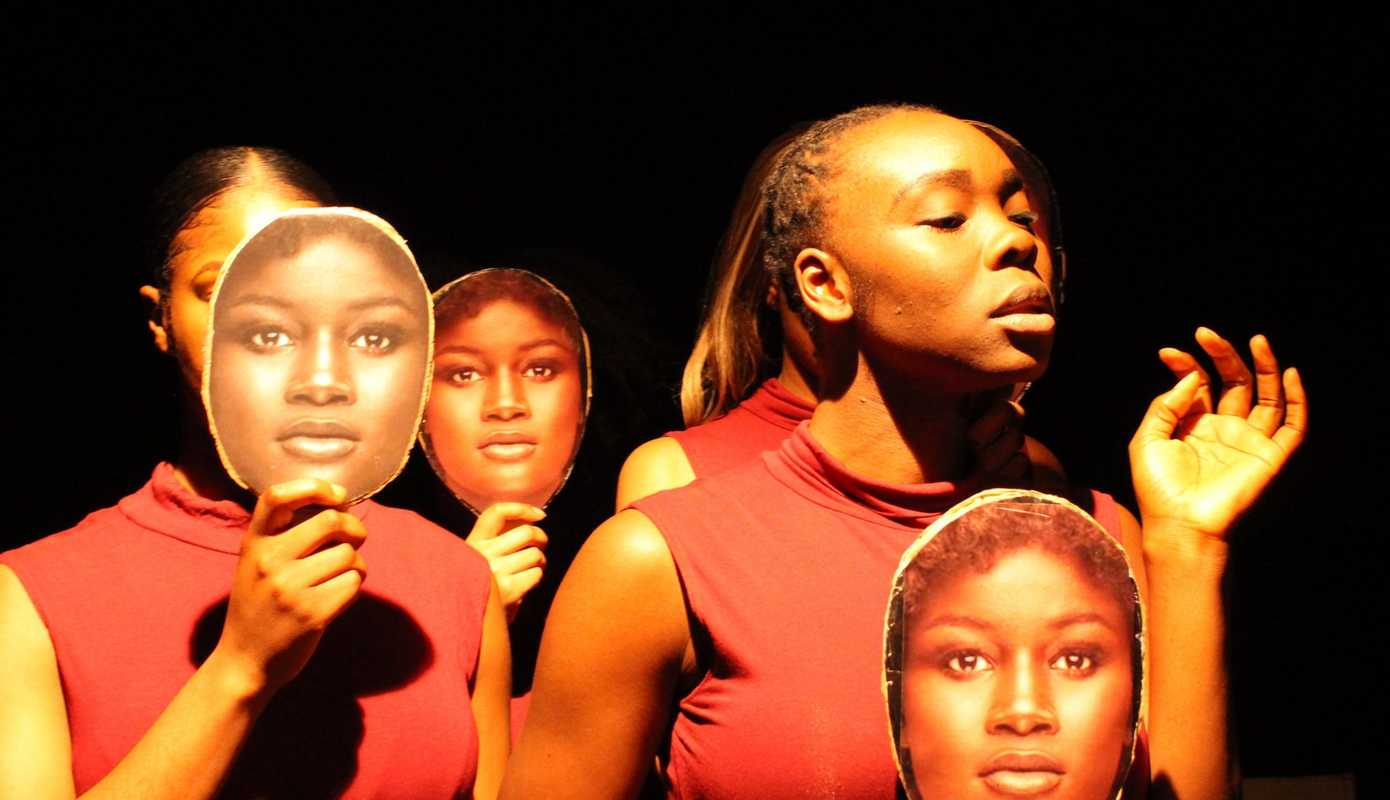DK Fashola is a South London playwright and performer who blends movement, music and spoken word. She is the co-founder and artistic director of Melanin Box Festival and her new play ‘Fragments of a Complicated Mind’ tackles, race, sex, and the surreal, unspoken thoughts of a black woman’s mind. Skin Deep’s Courtney Yusuf caught up with DK to chat multidisciplinary flow, intergenerational struggle, and twerking with your mum.
Courtney Yusuf: What are your first memories of movement?
DK Fashola: My strongest memory as a kid is of me and my mum twerking. It’s just what I remember and it was stunning, it was pure! We used to dance at home and my brother would think we were nerds, but it was a joyful thing [that happened] in the house every morning – just being in the dance with her. There was a culture in that house that made me love dance, so I started doing youth programs from there.
CY: In what ways has dancing and movement shaped your work?
DK: I might hear music and want to move physically and dance, and then as I’m doing that words might come to my head and I’ll say them out loud. Or the same thing can happen with writing – I’ll be writing something and think, ‘This is what the actors could be doing [in this moment] because dance is going to be the best thing here.’ So a lot of my work is interconnected.
CY: Do you think incorporating so many different mediums into your work actually makes it harder for you?
DK: Yeah, I definitely think it has done, especially earlier on. Back then, when I sat down with the theatres who are all now saying, ‘We want multidisciplinary stuff’, I would have conversations like: ‘I’m not sure because I don’t really understand it. I’m not sure if I like your work or not…’
CY: Ooof!
DK: Yeah I know! But that’s okay. When things are a bit different people don’t always gravitate there at first. That’s how time works, you know? I just have to create and pray that money and everything else to survive will come.

CY: How did you end up writing Fragments of a Complicated Mind?
DK: So much of it has come from the style in which I write: fragments. When I have ideas, they usually come in short form pieces as opposed to a full length play. Years ago when I first started writing and performing short pieces, I formed a group with some of my drama school peers. We’d go to a lot of poetry and scratch nights in the community and in 2008 we got booked for two years straight from one show. The pieces would be grouped into anthologies about love, identity and history – a social commentary so to speak. We then stopped doing that kind of work for a while, but then a few people started saying ‘You know what, everybody’s ready for what you guys were doing back then.’ So we’ve now decided to bring it back, so I’ve picked the best ones and refreshed them artistically. That’s how the fragments have come together. Whether the pieces are looking at sex, religion, family life, being a woman, being black and British – they’re all dealing with these ‘glitches’ in society, and challenging [them].
CY: You’ve now been working with some of these ‘fragments’ for over 10 years. In what ways do you feel that the world around you has changed and how has that influenced this iteration of the show?
DK: It’s crazy how much of what we were writing about then is still relevant today, colourism for example. I remember when I first wrote [about colourism] one of my mentors at the time, who was in her 40s, said to me,’You guys are talking about the things that I talked to my mum about!’ And now, here I am 10 years on, and I’ve got young actresses saying that the work really connects to their experiences today.
It’s also interesting being black and British in the context of the industry. Back then the only things we used to see were Kidulthood and Adulthood. The discussion of ‘it’s the same story’ has come up again [recently] with Top Boy. Those stories are valid, but times are changing. There’s no problem with those stories being out there, but why aren’t others also pushed to the forefront? Why is it that all the films that are deemed ‘successful’ in Black British cinema have a particular narrative? I remember Noel Clarke saying once that he had a film [idea] in which his best friend was white, and when he first took it to the studios they said that it wouldn’t be believable!
There are so many amazing black British writers, whether in film or stage, who are writing work with different narratives. It’s about getting those narratives seen and green-lit. That’s where the problem is.
CY: How have you as an artist changed in that time?
DK: As you get older, you start to reflect more. But as a creative, I’m at a place where I’m just kind of unbothered. When I was younger I felt the need to explain and qualify my work, but now I’ll put the work in, and whoever receives it, receives it. It went through a long period of struggling to be myself. Theatres say they want stuff that is ‘diverse and multidisciplinary’ but then still try to box you in. So now, I’m just like I don’t care, this is my work.
CY: What do you think determines those boxes?
DK: I can only speak from my experiences and what I’ve heard from other black creatives in the industry, but first and foremost it’s money. Everything comes down to money. I remember when I left drama school my teacher told me that at the end of the year the agents would only choose one black person. So they only choose one black female and one black male, and then fill the rest of the places on the course with white actors. Money affects who the drama schools even let in the building!
When people say, ‘Black people don’t go to the theatre,’ I wonder if they realise that if people don’t feel like it’s made for them, they won’t go. Who are they even marketing the shows to, and how are they trying to get these black and brown people into the theatres? There’s so many times when I’ve worked for a company and they don’t even know where to look and they’re not marketing in the right places.
CY: So what are the kind of strategies that you and others use to combat those boxes?
DK: It’s really hard. It takes blood, sweat, tears and sacrifice. Early on it can be really difficult when people say you need more credits, but in order to get those credits people want you to have more experience.
What we’ve done – myself and the people who created Melanin Box Festival – is to open those doors for ourselves. If people aren’t giving light to other narratives, then we’re going to do that. But it was really hard, I cannot lie. The first year we did one independently and I had no money in my own account for how long! All I will say is do what you can without killing yourself and your mental health. That’s honestly it!
CY: What other artists have inspired you?
DK: When I was younger, my biggest inspiration was Tupac. Because of the conversation about the Gemini – the good and the bad of human nature, and that whatever you nurture is what you become. I remember in school when a lot of my friends were doing certain things, listening to Tupac saved me in a way.
In terms of playwrights, George C Wolf who wrote The Colored Museum. When I read that my head exploded, it really inspired me. Similarly, when I read Ntozake Shange’s For Colored Girls. I’m in love with it – there’s movement, poetry, text. And debbie tucker green, a UK playwright with a writing style that’s different and disjointed. When I read her I was like ‘Yes. OK. This is different too. I can do this.’
CY: And how has your area shaped you?
DK: I’m of Nigerian heritage, but I grew up in Camberwell, London. There are things that I talk about in the play that draw on experiences I had growing up. When you’re young you don’t think certain things are a big deal, but when you are outside your environment you realise, ‘Rah, I come from a single parent household?’ All the people around me lived in the same kind of family situations: broken homes etc, but we just did what we could to get by. [There are] things I probably shouldn’t have seen as a child. I probably shouldn’t have gone through certain things. So my environment has influenced the work and the creativity. Another thing you’ll see is my Nigerian heritage alongside my British culture. When I first went to Nigeria as a teenager I really felt how in London your black but when you’re back home you’re British. What does that do to you as a human being?
CY: What’s the biggest thing you’ve learnt from the process of putting ‘Fragments’ together?
DK: That you have to learn to enjoy it more. Really, everything is out of your hands. Life just does what life does and it takes a lot of stress, but when you can look back and see how your work affects other people, you can learn to enjoy it. Otherwise you’re gonna miss the moment.
Check out ‘Fragments of a Complicated Mind’ at London’s 503 Theatre running from now until Saturday February 1st. You can buy tickets here.




